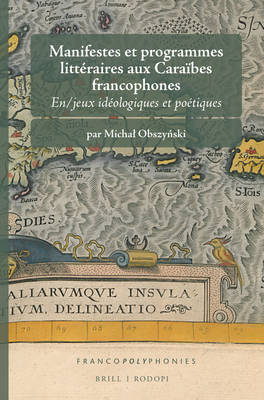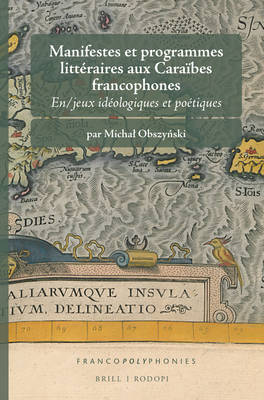
- Afhalen na 1 uur in een winkel met voorraad
- Gratis thuislevering in België vanaf € 30
- Ruim aanbod met 7 miljoen producten
- Afhalen na 1 uur in een winkel met voorraad
- Gratis thuislevering in België vanaf € 30
- Ruim aanbod met 7 miljoen producten
Zoeken
Manifestes et programmes littéraires aux Caraïbes francophones
Michal Obszyński
€ 118,45
+ 236 punten
Omschrijving
Dans Manifestes et programmes littéraires aux Caraïbes francophones, Michal Obszyński étudie les enjeux esthétiques et idéologiques qui sous-tendent les principaux textes manifestaires et programmatiques publiés aux Caraïbes francophones depuis le début du XXe siècle jusqu'à nos jours.
In Manifestes et programmes littéraires aux Caraïbes francophone, Michal Obszyński examines the aesthetic and ideological issues underlying the main manifestoes and programmatic texts published in the French speaking Caribbean since the early twentieth century to the present.
In Manifestes et programmes littéraires aux Caraïbes francophone, Michal Obszyński examines the aesthetic and ideological issues underlying the main manifestoes and programmatic texts published in the French speaking Caribbean since the early twentieth century to the present.
Specificaties
Betrokkenen
- Auteur(s):
- Uitgeverij:
Inhoud
- Aantal bladzijden:
- 272
- Taal:
- Frans
- Reeks:
- Reeksnummer:
- nr. 19
Eigenschappen
- Productcode (EAN):
- 9789004309128
- Verschijningsdatum:
- 30/10/2015
- Uitvoering:
- Paperback
- Formaat:
- Trade paperback (VS)
- Afmetingen:
- 155 mm x 234 mm
- Gewicht:
- 430 g

Alleen bij Standaard Boekhandel
+ 236 punten op je klantenkaart van Standaard Boekhandel
Beoordelingen
We publiceren alleen reviews die voldoen aan de voorwaarden voor reviews. Bekijk onze voorwaarden voor reviews.








